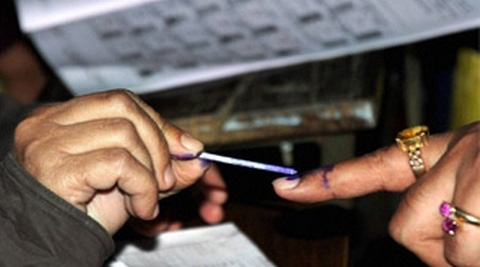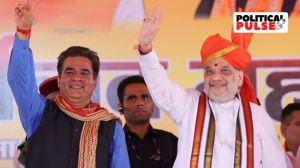- India
- International
Politics in its place
Focusing all our attention on the state, we miss our own deeper failings of social trust.
 Individuals in low-trust countries want more government intervention even if government is corrupt. (PTI)
Individuals in low-trust countries want more government intervention even if government is corrupt. (PTI)
Focusing all our attention on the state, we miss our own deeper failings of social trust.
In India, has political failure become an alibi for deep social failure? A moment’s reflection on contemporary India’s deepest challenges will prompt this thought. But this thought has also been a source of an abiding tension in Indian thinking about social change. On one hand, there is Gandhi’s prescient insight about the compulsiveness of politics. He once said, “If I take part in politics it is only because politics encircles us today like the coil of the snake from which we cannot get out no matter how much one tries.
I wish, therefore to wrestle with the snake.” On the other hand, he himself wondered, whether the cure lay only through politics. He often despaired of politics and thought the path of change lay through an engagement with social reform and a transformation of consciousness. It was as if politics had a snake-like character because of the ground that nourished it.
One of contemporary India’s great strengths has been the centrality of politics to our imagination. This gives democracy energy, elicits excitement and participation. But you have to occasionally wonder whether this obsession with politics is really about solving social problems or finding an excuse for them. Just think of three puzzles that have cropped up in the last week that have a bearing on India’s long-term future. Although disparate, they make you wonder if politics is the symptom or the disease.
Liberals in India have constantly been frustrated by two things. Almost every political movement that claims to represent the people seems to want to over-regulate them. For every problem, we need a law. Even when we know government to be corrupt, we want more government. Although Narendra Modi promises to emphasise governance instead of government, the substance of his governance seems no more liberal than anyone else’s. Of course, in some areas we need more government, not less. But our mania for government and regulation does not stem from any functional justification: it stems from an attraction to government and regulation itself. What is going on?

The simple answer is, of course, that this is a symptom of a low-trust society. There is no point lamenting the absence of a genuinely liberal impulse in our politics, if society is rife with mistrust. The point of more regulation is not to achieve particular objectives; it is to sublimate our distrust of each other. That is why we love regulation even when know it is ill designed and ineffective. Our exaltation of government is not an ideological disposition; it is a deeply psychological one.
Indeed, the main thrust of modern social science seems to confirm this proposition. An important 2009 paper by Aghion et al on regulation and distrust pointed out this paradox. It argued that individuals in low-trust countries want more government intervention even though government is corrupt. It also pointed out that there is what we might call a trust trap: low-trust societies do not invest enough in citizen-to-citizen mechanisms of resolving issues; they repose more trust in the state. But the more we rely on the state, the weaker society becomes. We are ready to put ourselves at the mercy of the state, since we dare not put ourselves at each other’s mercy. But this does raise a large question. Is it the snake of politics that holds us back? Or does the grip of the coiling snake of politics seem so much tighter because of the nature of our society?
The second issue of discomfort to liberals has been the appalling moral obtuseness of the Indian Supreme Court on Section 377 of the IPC. The silver lining has been that the Congress and the AAP, for a change, took a clear moral stand. Although, the BJP lost a great opportunity to demonstrate that it is the party of the future. But, political positions apart, you have to wonder, what it is about our social system, or the failure of liberal education in India, that some of our eminent jurists do not seem to be capable of some simple moral decency or point of logic. One is tempted to remind them of M.G. Ranade’s eloquent warning: “You cannot be liberal by halves. You cannot be liberal in politics and conservative in religion. The heart and the head must go together.
You cannot cultivate your intellect, enrich your mind, enlarge the sphere of your political rights and privileges, and at the same time keep your hearts closed and cramped. It is an idle dream to expect men to remain enchained and enshackled in their own superstition and social evils, while they are struggling hard to win rights and privileges from their rulers. Before long these vain dreamers will find their dreams lost.” But again, the question arises: are we displacing on to politics a deep social failure?
The third big story of the last week was yet another ASER report pointing to the dismal state of Indian education. The results were not a surprise. And of course, politics has played an important part in producing the dismal picture that we see in Indian education. But let us be clear. When the history of Indian education is written, the biggest story in it will not be the perfidy of politicians. It will be the self-abdication of educators.
One reason education regulation is so overbearing and convoluted is because of a fundamental absence of trust in educators. The entire edifice of absurd regulations has been built not to produce pedagogic outcomes, but to psychologically compensate for low trust. And the point about low trust is this. It is a self-fulfilling prophecy. If low trust is the starting point, low trust will also be the outcome. That seems to be the really inescapable coil of the snake. But there is an even deeper question. When you read reports of teacher absenteeism, mindless curricula and the formidable lethargy of the education system, you have to wonder what is going on. Is it simply that vested interests have taken over?
There is also a striking absence: with the exception of a few NGO’s and individuals, where is the energy in education? Where is the groundswell of leadership among educators, where is the evidence that we as a society recognise the gravity of the problem?
Politics is important. It is deeply thrilling. But there is a danger that politics also becomes the narcotic, the narcotic that numbs the pain of recognising that we don’t trust each other enough. Liberal regulation, liberal values, and liberal education are in short supply not because politics failed us. But because we failed politics. A Gandhian thought to contemplate on the anniversary of Gandhi’s assassination.
The writer is president, Centre for Policy Research, Delhi,and a contributing editor for ‘The Indian Express’
express@expressindia.com
EXPRESS OPINION
More Explained
Apr 26: Latest News
- 01
- 02
- 03
- 04
- 05










































